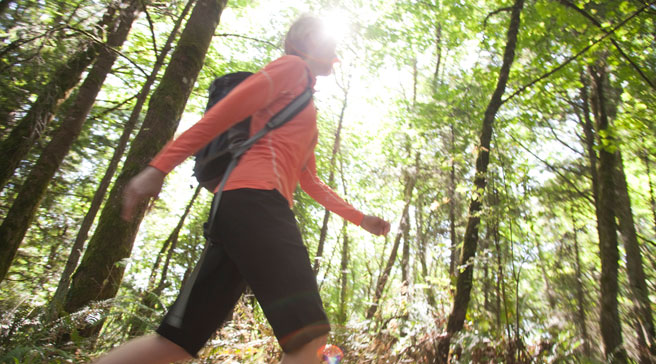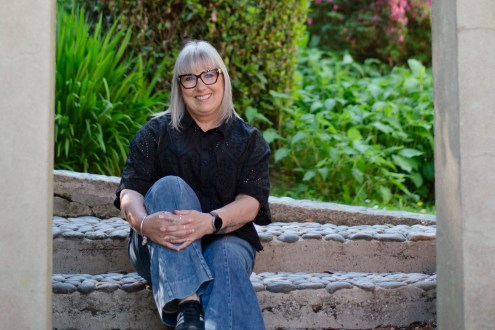The benefits of walking
Walking can boost your mind, body and soul, says Graham Barker

Walking is often called the perfect exercise. It’s remarkable something so simple – putting one foot in front of the other – can be so restorative and invigorating. But the medical evidence is compelling. Taking regular brisk walks helps you stay healthy, live longer and boosts your self-esteem and mood.
Television presenter and Ramblers president Julia Bradbury is the modern face of walking. Her passion started as a six-year-old in the Peak District with her father: ‘I love the Peak District and, over the years, walking with Dad through the valleys and limestone hills, I developed a comfortable outdoor spirit.’
Bradbury’s television series Wainwright Walks and Railway Walks have helped inspire a renewed interest in country walking. A Ramblers survey revealed 77 per cent of UK adults – about 38 million people – walk for pleasure at least once a month. Of these, 62 per cent cover more than two miles a time. With so many demands on our time, it can be hard to make space for a worthwhile walk. But if you can manage to fit one in, the payback can be enormous – an all-round lift for the mind, body and soul.
- Discover the best walking gear for women
1. Refresh your mind
There’s something about the regular roll and rhythm of walking that frees the mind and sparks creative connections, so it’s not surprising many writers have used walking to stimulate creativity. ‘Walk and be happy, walk and be healthy,’ said Charles Dickens. A phenomenal walker, in his diaries he recorded how, during 20-mile treks, he would come up with the plots for his novels.
Whether you’re dreaming up your own bestseller, or figuring out a challenge at work or home, walking gives you time to reflect. ‘I try to walk home from the office once or twice a week,’ says Katie, 26, from north London. ‘It helps me escape my computer and emails, and gives me space to think through new projects.’ For children, the words ‘let’s go for a walk’ might trigger groans of protest, but with a little imagination you can turn a trial into a treat. ‘Children need paths to explore… paths down the garden, the way to school, corridors through the bracken or long grass,’ wrote the late travel writer Bruce Chatwin.
If you can, create ways to plan routes that will trigger children’s curiosity and sense of discovery. Sarah, 38, from Tonbridge in Kent, uses a storytelling approach with her nieces, Becky, seven, and Amelia, five. ‘I devised a short route around the Ashdown Forest where we read out a few snippets from Winnie The Pooh and even played a game of Pooh Sticks. The girls were hooked.’
2. Boost your body
‘Walking is man’s best medicine,’ said Ancient Greek physician Hippocrates, although he was probably talking more from gut instinct than medical research. These days, there is plenty of scientific evidence to show that regular walking helps reduce the risk of high blood pressure, raised levels of cholesterol, heart disease, stroke, type 2 diabetes and some cancers.
The government recommend at least 30 minutes of brisk walking or other physical activity five times a week. ‘Brisk’ meaning you will breathe a little faster than normal, feel warmer and your heart beats slightly faster, but you are still able to carry on a conversation.
As a result, walking programmes are on the rise. In the London borough of Tower Hamlets, sustainable transport officer Rachel Maile has set up a Walks On Prescription scheme, where local GPs can refer patients for a 10-week programme. ‘By joining our weekly walks, participants can proactively manage their weight, diabetes and other health conditions,’ says Maile. ‘They’re given a step counter and encouraged to monitor their progress, week by week, towards a more active lifestyle.’ Even going for a relatively short daily stroll can help. ‘Studies show people who walk at least part of the way to work are more productive, happier and off sick less,’ says Maile.
3. Restore your soul
As Slow Movement pioneer, and author of In Praise Of Slow, Carl Honoré says, ‘Travelling on foot can be meditative, fostering a slow frame of mind. When we walk, we are aware of the details around us – birds, trees, the sky, shops and houses, other people. We make connections.’ Making these connections with our surroundings can lift our spirits.
An Essex University research team has shown that ‘green exercise’ – walking in a natural environment – markedly reduces stress levels, and enhances mood and self-esteem. So take the chance to reconnect with nature whenever you can. When you head for your local park, woodland, river or beach, keep your senses alert and tune in to what’s around you. The sky, for example. The Cloudspotter’s Guide by Gavin Pretor-Pinney tells you the difference between cirrocumulus (rippling, mackerel skies) and nimbostratus (rain on the way), or Will Cohu’s Out Of The Woods will help you distinguish ash trees from oaks and maples. You can even learn to find your own food.
Suzie, 59, from Surrey, joined one of Fergus the Forager’s courses to hunt for edible fungi, flora and seaweed, then cooked dinner over an open fire, using the foraged ingredients. ‘I was amazed at the number of edible plants growing in our hedgerows and woods, and learned how to distinguish tasty pickings from toxic lookalikes,’ she says.
4. Enhance your social life
‘The true charm of pedestrianism does not lie in the walking, or in the scenery, but in the talking,’ said Mark Twain. You can use a walk to chat and catch up with your partner, family and friends; enjoy the puff-and-pant challenge of climbing a hill together; or maybe join a walking group.
BBC sports presenter Clare Balding enjoys walking as a social activity. Her interviews for Radio 4’s Ramblings dispel the idea of rambling being a niche activity. ‘There are different sorts of walking and very different sorts of walkers,’ she says. ‘Not everyone has to wear a cagoule, gaiters and wield a stick.’
In her latest series, Balding walked with artists, musicians and dog owners. As she says, ‘The gym experience is not for everyone. Salvation comes in the form of a good old-fashioned walk.’ So, what are you waiting for? It’s hardly a new idea – but sometimes, the old ones are the best.
Graham Barker runs Walk East, a social enterprise to encourage more walking in east London.
More inspiration:
Read The call of silence by Mark Vernon on LifeLabs









